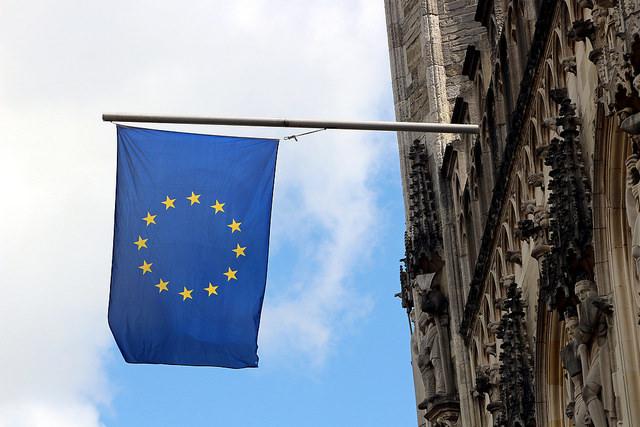 Over the past fortnight, the dawning realisation that Brexit could actually happen has sent the British establishment groping for the campaign panic button. Until now, the Remain side has sat comfortably on the sorts of polling numbers that would keep the status quo intact. Last week, however, bookmakers odds on Brexit shortened dramatically. Could disgruntled Brits really be about to upset a tidy international order?
Over the past fortnight, the dawning realisation that Brexit could actually happen has sent the British establishment groping for the campaign panic button. Until now, the Remain side has sat comfortably on the sorts of polling numbers that would keep the status quo intact. Last week, however, bookmakers odds on Brexit shortened dramatically. Could disgruntled Brits really be about to upset a tidy international order?
The oddest aspect to this campaign is the sheer uncertainty of the outcome. The referendum is a psephologist’s nightmare. Pollsters struggle to build representative samples, because there are no precedents. The principal issues—immigration, the economy and sovereignty—cut across political divides and socio-economic groups.
With a week to go, however, the fact is that the Remain camp have failed to nail it. To be fair, it isn’t easy for them to craft a strategy, because they aren’t a coherent group. In party political terms, the Remainers are best imagined as the High Tory Conservatives who always winced at ‘Thatcher’, and the Not-so New Labourites who always winced at Socialism. By default, they’ve aligned behind the classic establishment manifesto: ‘Change is Risky and Bad’.
The problem is, they haven’t been able to prove it—at least in economic terms. The government has published exhaustive reports and wheeled out institutional heads to deliver stern lectures on the economic consequences of Brexit. But popular deference to expert opinion is conspicuously absent.
Conversely, Leave campaigners are a more coherent group than anyone imagined. Left alone, the Brexiteers instinctively decry the evils of over-regulation and vested interest, and proselytise global free trade and fair markets. It’s a strange way for Liberal England to resurrect, but Brexiteers are grasping at an ancient political thread. Who knows if they’ll pick it up. Whether the Tory Party reads the portents or not, an ideological divide presages a full-on party split.
Immigration is the UK electorate’s most voluble concern, with arrivals rising to 300,000 in 2015. Following Lynton Crosby’s helpful suggestion, Brexiteers are focussing relentlessly on the impact of immigration on perennially stretched social services led by health and education.
The Remain camp has no answer to this all-too-palpable issue. The free movement of people is a principle of the EU Project and a condition of the Single Market. Cameron’s attempt to renegotiate migrants’ rights in February was so poorly received that his side doesn’t dare mention it. Seemingly, his only achievement was to make crystal clear the limitations of UK influence in Brussels, and provide a concrete example of why sovereignty matters.
For Remain, Brexit’s weak spot is voters’ wallets. It worked on the Scots after all. But painting Brexiteers as economic luddites has proven a challenge, with ex-Chancellors, heavyweight industrialists and entrepreneurs, and the former London Mayor, Boris Johnson, in their midst. Few people understand UK Treasury’s economic modelling, but they can grasp a burgeoning trade deficit with the EU. They also see UK products like the iconic Land-Rover Defender fall victim to EU emission rules that German car makers choose to flout.
David Cameron’s bid to bolster his case with friendly ‘advice’ from global heavyweights has backfired. Obama doubtless had strategic Washington interests to heart during his April visit. But his ‘back of the queue’ putdown caused visceral offence. Brexit promptly gained a three-point boost, and EU leaders have wisely stayed stumm ever since.
So what’s likely to swing it? If the Remain camp can’t persuade voters that Brexit is economic suicide, what’s left in their arsenal? Possibly the spectre of the final fall of the Westminster Raj. The drums of a second Scottish referendum are already beating, while a ghoulish Major-Blair pairing has warned of renewed violence in Ulster.
But isn’t this just more panic-mongering? Realistically, if the Scots didn’t like the look of England as a separate country, the prospect of England as a separate country plus tariffs is less pleasing still. And that’s what Brexit will mean, because the EU’s Single Market is doing UK trade next to zero favours and the EU leadership will have to play hardball, ‘pour encourager les autres’.
Meanwhile, implying that peaceful Irish co-existence is a bounty that descends from Brussels is both patronising and obtuse: raising eyebrows in Ulster without lowering temperatures in London.
To be fair, both sides have indulged in hyperbole. But therein lies the danger. The key to this referendum is a profound electoral distrust of official advice. The ghost of 2003 and the Iraq war still hovers—a time when the populace accepted official claims at face value. Well, there were no WMD. And since then, officialdom has fought a seven-year, rear-guard action to prevent its mis-pronouncements being dragged into daylight.
The Government’s failure to adjust to a sceptical political climate now puts the result at risk. Crying wolf simply isn’t working. Each dire and un-substantiated warning elicits the response: ‘If that’s the best they can come up with, then….’ Foreign analysts should understand that in the absence of clear facts, much of the UK electorate will vote on gut instinct. And who actually loves the EU? It looks increasingly likely that on June 23, while the world rubs its eyes, Britons will awake to a new freedom.